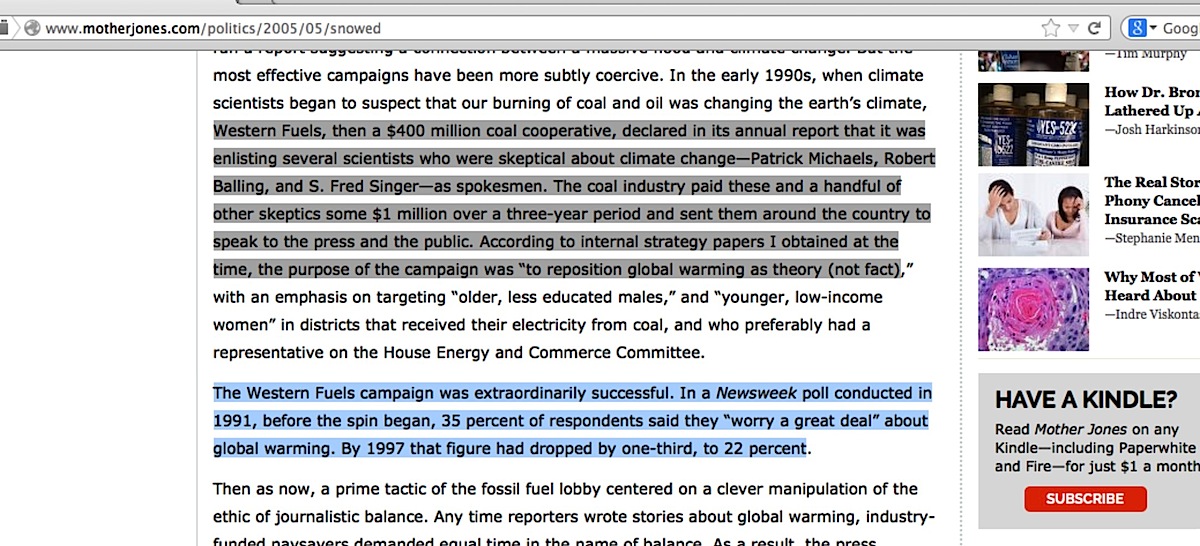A brief set of questions and answers illustrates how any sort of examination of the ‘skeptic climate scientists are industry-corrupted’ accusation doesn’t reveal a nice, tidy, open-and-shut case against such skeptics, all that’s seen is something begging for a deeper investigation of why the accusation exists at all. Continue reading
Category Archives: Repeated talking points
‘Skeptic Climate Scientists Do Not Deserve Fair Media Balance.’ Spread This Line Widely; NEVER Check its Veracity and Don’t Examine its History.
‘When a topic is soundly settled, it is egregiously stupid to consider long-debunked counterclaims, and Ross Gelbspan was among the first to see the stupidity of anyone doing exactly that in discussions about global warming.’ This would be a devastating statement if either of the two premises within it were demonstratively true. So, why would anyone make such a statement if either premise cannot stand on its merits? Continue reading
Leaving out a Vital Detail about the Western Fuels Association
Ross Gelbspan’s claim about statements in Western Fuels’ annual report – which are not there – is a major problem. His other consistent description about that organization, which leaves out a vital detail, is an additional problem. Continue reading
Timeline History and Inconvenient Truths of Ross Gelbspan’s and Al Gore’s “reposition global warming” Phrase
The idea of man-caused global warming is especially effective because it can be pounded into practically everybody’s head via three easily memorized talking points. Global warming believers need only to counter dry recitations of skeptic science material with:
- assertions that the sheer numbers of ‘climate scientists’ on the IPCC side indicates this to be the overwhelming consensus opinion
- claims about leaked memo evidence proving skeptics are paid industry money to “reposition global warming as theory rather than fact” – dupe the public, in other words
- the obvious conclusion that reporters aren’t obligated to give fair balance to skeptics because of the previous two points.
In a nutshell, settled science, crooked skeptics, reporters may ignore skeptics — bam, bam, bam.
A timeline of where, how and when that “reposition global warming” phrase first appeared and where it prominently pops up afterward is something global warming believers would hate, since it might prompt a total loss of faith in the validity of that central accusation point. The loss could cascade into questions of whether the science actually is settled in the face of skeptics’ science-based criticisms, and people may also start to wonder about the ‘fair media balance’ idea, since they might not readily recall instances where skeptics actually received that from mainstream media reporters. Continue reading
‘Skeptic Climate Scientists are Inconsistent on what They Say.’ Spread This Line Widely; NEVER Check its Veracity.
It’s a simple narrative to grasp. You say ‘Skeptic scientists first claimed global warming is not happening, then they said it is happening but is not man-made, then they caved in and said it is man-made and is either good for plants, or too expensive and too late to fix’. This makes them look foolish, and you look like a really smart, reasoned person with full knowledge of the topic. Mention those skeptics are funded by ‘big coal & oil’, and you’ll gain more adoration as someone who exposes sinister hidden truths. However, you better hope nobody notices how the skeptics have consistently said this entire time that the IPCC has not conclusively proved human-induced CO2, an otherwise harmless greenhouse gas, is the main driver of what little global warming we’ve seen over the last century. Continue reading
The ‘television editor told me “We did. Once.”’ Problem
My 11/8 blog piece recapped six problems seen with a single paragraph written by Ross Gelbspan in a 2005 Mother Jones article, and went on to tell about another of his major narrative derailments. But I mentioned there was one more big problem that needed a separate blog piece to examine it. That’s what this piece will cover. Continue reading
‘Industry PR Campaign sways US Opinion’; except practically nobody saw it
Ross Gelbspan’s “Snowed” article in the May/June 2005 issue of Mother Jones magazine described how a ‘misguided application of journalistic balance’ and ‘a decade-long campaign of deception, disinformation, and, at times, intimidation by the fossil fuel lobby’ was causing the media not to properly warn us about the perils of global warming. Accept his narrative without question, and it’s a rallying cry to solve the problem. But notice the errors in his article’s 5th & 6th paragraphs, and it makes you wonder how much more he gets wrong.

‘Public Paralyzed by, Denies, Global Warming Peril’. Today; 2007; 2000.
The idea that a large swath of public reacts with an automatic denial defense mechanism against the ‘too-large-to-comprehend’ global warming crisis is not a brand-new analysis today. It dates to a speech Ross Gelbspan gave over a decade ago. Continue reading
